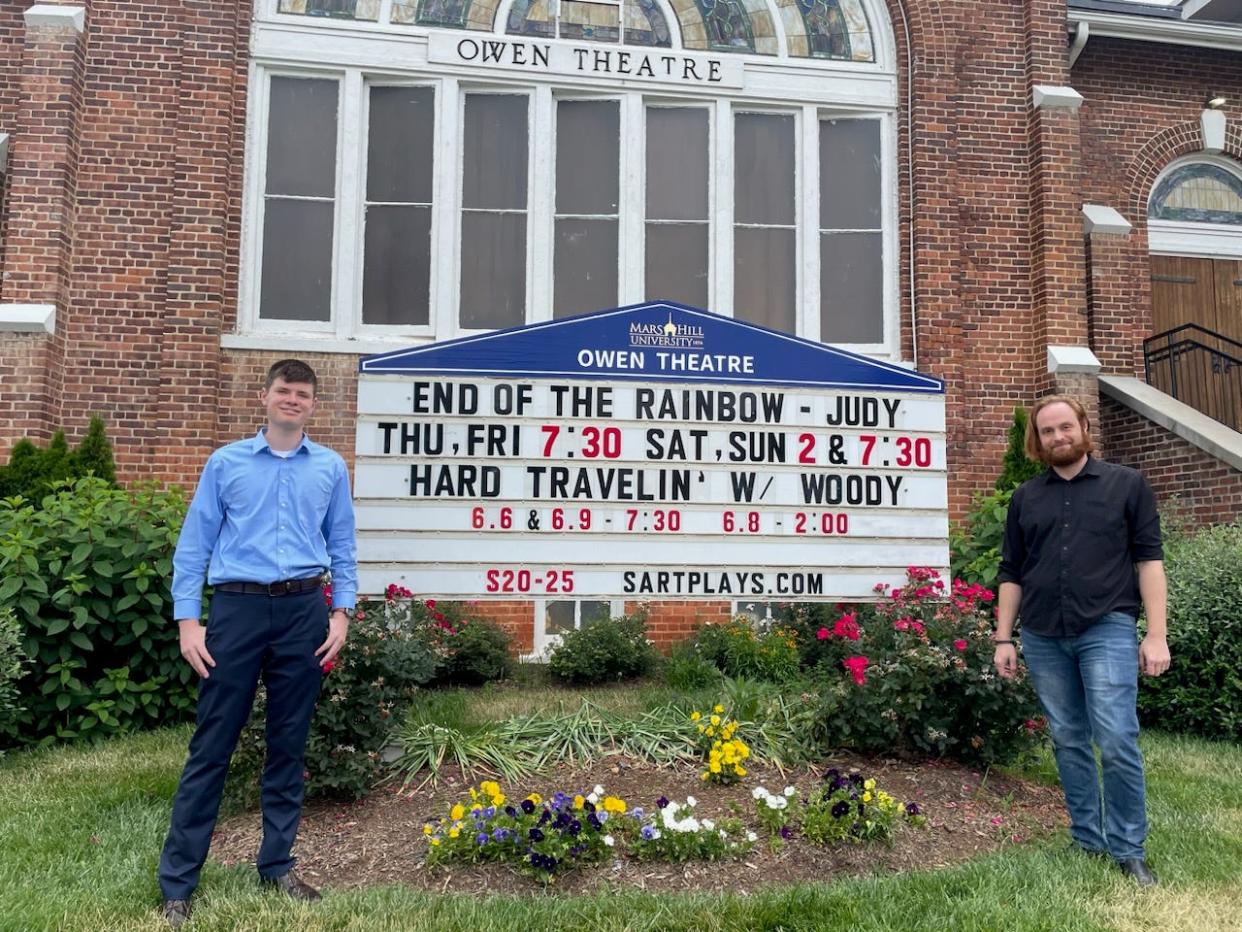Mars Hill theater helping to 'bridge the gap' in community ahead of 50th season

MARS HILL - As Mars Hill's Southern Appalachian Repertory Theatre heads into its 50th season, excitement surrounding what its employees refer to as a "hidden gem" is at an all-time high.
The theater is hosting eight shows this spring/summer, including "Hard Travelin' with Woody," featuring the music and art of Woody Guthrie, "The Fantasticks," featuring an all-star staged reading and concert event, as well as the classic "Fiddler on the Roof."
In July, Southern Appalachian Repertory Theatre will put on productions of "Charlotte's Web," as well as concurrent showings of "The Tall Woman," a play based on the novel by Wilma Dykeman, and "Taking a Chance on Love," a play by one of the theater's founding members, C. Robert Jones.
The News-Record & Sentinel spoke with Will Ezzell, the managing artistic director, and Jack Womack, the administrative director, about the current state of the Mars Hill repertory theater.
"We normally do like four or five shows, but I wanted to do a huge season for our 50th anniversary," Ezzell said.
Additionally, this season will mark the first time the theatre has hosted two shows at the same time, Ezzell said.
"So what 'repertory' in the theater world means is generally, you hire a cast and they put on a bunch of shows over a short amount of time. That is part of the repertory style where they're performing one show at night and rehearsing the next show during the day," Ezzell said.
"SART hasn't done that in probably 10 or 15 years, and I wanted to kind of go back to our repertory style, for our 50th season."
In addition to the Owen Theatre, the SART team also utilizes its smaller black box theater, which was built in 2017.
According to Ezzell and Womack, the multiple shows format affords out-of-town visitors and locals alike the opportunity to see different shows and a flexibility in moving ticket purchases around.
In Ezzell's view, the theater has been a big draw for visitors.
Ezzell said according to his research for writing grants, a typical summer crowd consists of usually about 40% or 50% of visitors from out of town, and about 10% to 20% are from out of state.
"A couple of years ago, we did a production of 'Hunchback of Notre Dame,' and in the book, Quasimodo is deaf because of the bells. In a push for accessibility, we hired a deaf actor and had ASL interpreters," Ezzell said.
"That went viral on social media, and we had people coming from all over the country to see that special production. So, we've been able to bring people who would never have come to Madison County otherwise into our community, and then they patronize all the businesses downtown. So, for that reason, the Tourism Development Authority is our largest sponsor, because they recognize the economic benefit."

Part of what makes SART different from a community theater is that, as a regional theater, it pays its actors.
"That means we can hire actual, working professional actors to come in, and that provides both an opportunity for both the Mars Hill theater department students and interns from all over the country to come and have a positive theater experience, and build credit to their resume, and just learn from each other and from professional working actors," Ezzell said. "It's a melting pot opportunity for everybody."
The theater has roughly 108 performers, according to Ezzell.

And according to Womack, a 17-year-old rising senior, recent developments such as the rollout of an endowment could help ensure that the theater will celebrate its 100-year anniversary.
Of the 10 working theaters in Western North Carolina, SART is one of only a few in the region that pays an actual wage.
"We're able to choose from a broader talent pool, and because we pay, people are excited to come work here," Ezzell said. "That way, we're able to bring in a kind of higher-level performer."
Ezzell moved to Western North Carolina from Texas via Los Angeles, where he and his wife lived when Ezzell moved with his band, The Gypsy Davies, to Hollywood.
Ezzell credits the move to Western North Carolina with reawakening his love for theater, as he started working with the Asheville Community Theatre shortly after moving to the area in 2018. Ezzell's wife also works with SART.
When he got here, Ezzell was pleasantly surprised to see such a vibrant theater scene in Western North Carolina.
"I worked as a graphic designer after school for 10 years, not really thinking that theater was going to be a plausible career path for me, so I didn't expect to move here and find theater - I came here for music and community, and then discovered that this area has a really rich, vibrant theater community."
Ezzell has been intentional about fusing his love of music and theater by hiring musicians to perform in the plays, which is how he stumbled on Womack.
He was directing a bluegrass musical, Golden Boy of the Blue Ridge, but he couldn't for the life of him find a fiddle player.
"I was literally sitting in my office one Saturday morning going through no emails from people I had reached out to about playing fiddle in the show, and I was panicking because I was a month away from the show, and I couldn't find a fiddle player," Ezzell said. "And then I heard fiddle music."
Womack was stationed at the Mars Hill Farmers Market, and was playing fiddle tunes for visitors.
Womack learned the instrument under old-time musicians such as Roger Howell. Howell is a veritable Appalachian music encyclopedia. In 2017, Howell finished recording almost 700 tunes from memory — a “Memory Collection,” which is housed in the Ramsey Center’s Southern Appalachian Archives.
More: Weekly The Depot bluegrass jams Passing the torch: Weekly Marshall bluegrass jams preserve mountain music tradition
More: Musicians honored: Lunsford Awards John Roten, who peers say 'lives the music,' honored with Lunsford Award
Even as a native of the county, Womack admits he, too, was surprised by all SART has to offer.
"I knew there was a theater here, but I didn't realize that there were so many shows constantly going on," Womack said. "The more I talk to people in the community, I feel like it might be more of a hidden gem. I feel like the people who know about it really love it. I would probably say the majority of people have heard of it, but definitely it's probably in the minority of people who have come and experienced it."
Womack is a Madison County native. His great-grandfather laid bricks at the school to pay his tuition.
"It's funny, full-circle, going from that, and not even knowing this was here and not realizing the history of Mars Hill University specifically, to coming here," Womack said. "Our farm's just down the road in Mars Hill here, so it's a great connection. And I'm sure for lots of people in Madison County, there's probably a big demographic who would really appreciate this."
For Womack, who had no theater background prior to meeting Ezzell, he's used the opportunity to help "bridge the gap" between theater enthusiasts and those with little to no exposure to the theater scene in general.
In March, the SART team put on an Appalachian music-themed show featuring Womack and Womack brought in musicians such as Howell and Gary Spence, who has taught music at Mars Hill for more than 50 years. Other musicians for the show, "Live on Mars: Jack Womack and Friends" included Scotty Owensby, Ben Owensby and Mike Bradley.
Bridging that gap was a goal identified by Ezzell when he moved to the area.
"What I noticed is this area has an extremely rich vibrant music community and a surprisingly vibrant theater community, but the twain don't intersect a lot," Ezzell said. "Which doesn't make sense to me. Music and theater are, for me, part of the same scope, in many ways. So, I wanted a way to bring live music into the theater so that theater audiences who might not go to bars and hear live music have an opportunity to kind of dip their toe in that world, and vice versa."
What Ezzell figured out in giving musicians a theater, they're given a lot of agency in the show's production value, too.
Womack and his family brought a number of windows and set decorations to be placed throughout the show for the December showings.
Ultimately, the theater is bringing people together in new ways, an encouraging sign for the community as a whole, according to Womack.
"It's bridging the gap, because our music community and our theater community, I feel like they kind of look down on each other," Womack said. "Specifically, the more traditional musicians here. So, I think it was a really cool opportunity. We probably had 12 musicians on the stage, and they were all old-timers. It's just cool because a lot of those guys have never been in a theater setting.
"So it's just cool. It's helped build connections. We're able to utilize a lot of people in the community, which is really unique, because that's something that's dear to my heart. I know as a young person, and as someone who's lived here my whole life, it's a unique opportunity to get to engage people in the community with that."
For more information on the Southern Appalachian Repertory Theatre, visit its website: https://www.sartplays.com/, or head to the box office at 44 College St. in Mars Hill.
Johnny Casey has covered Madison County for The Citizen Times and The News-Record & Sentinel for three years. He earned a first-place award in beat news reporting in the 2023 North Carolina Press Association awards. He can be reached at 828-210-6074 or jcasey@citizentimes.com.
This article originally appeared on Asheville Citizen Times: SART helping to 'bridge the gap' in community ahead of 50th season

